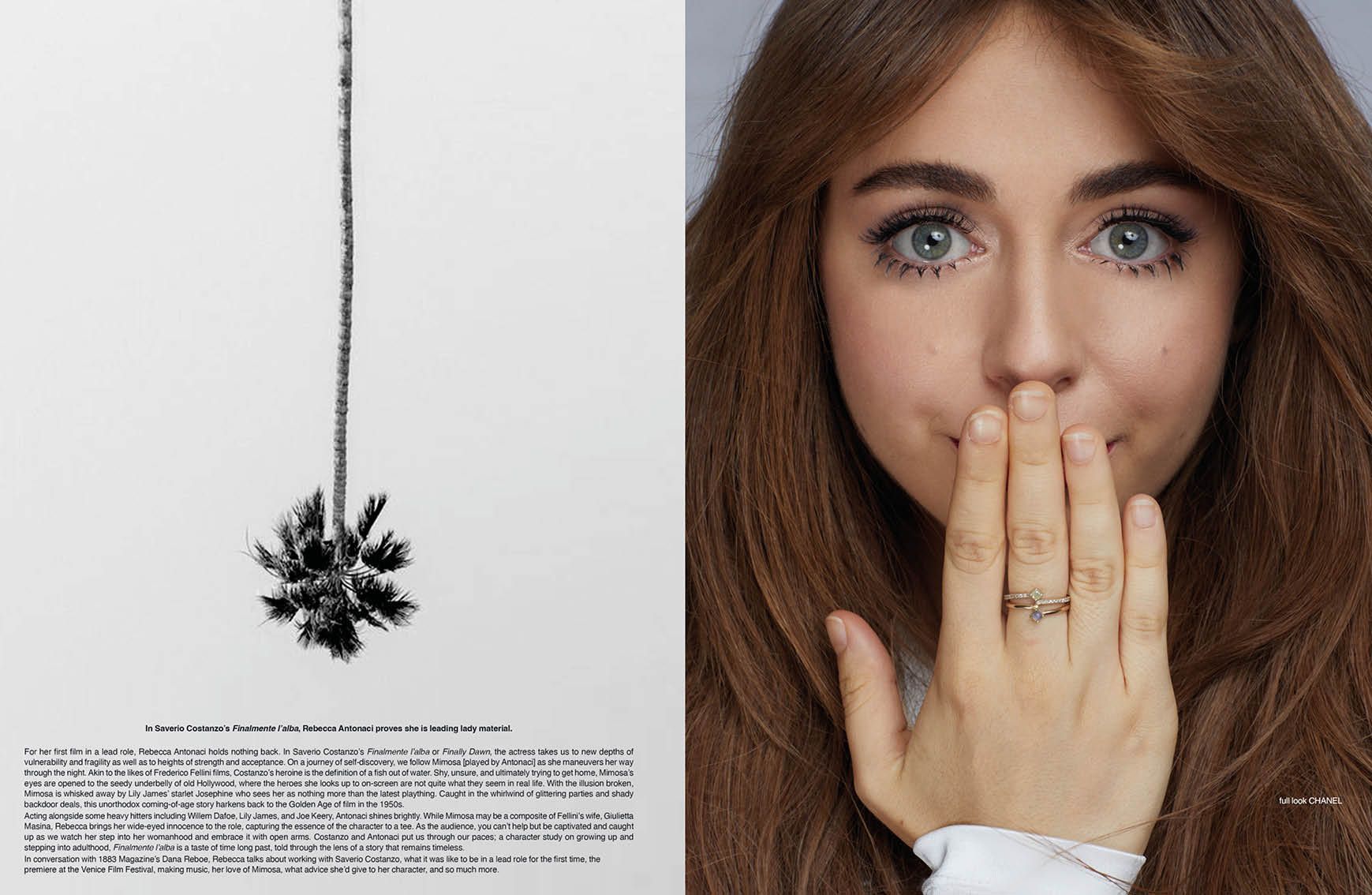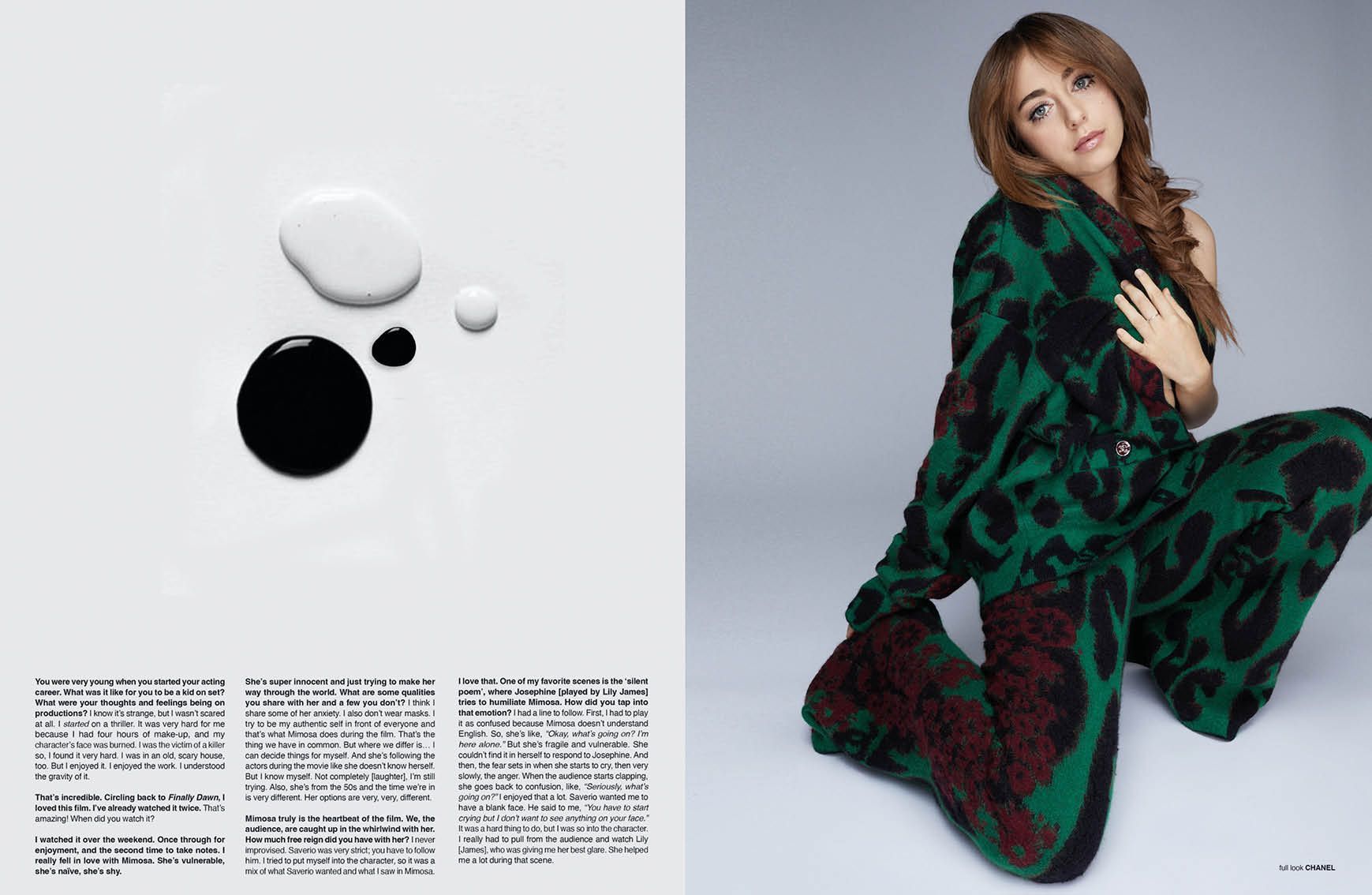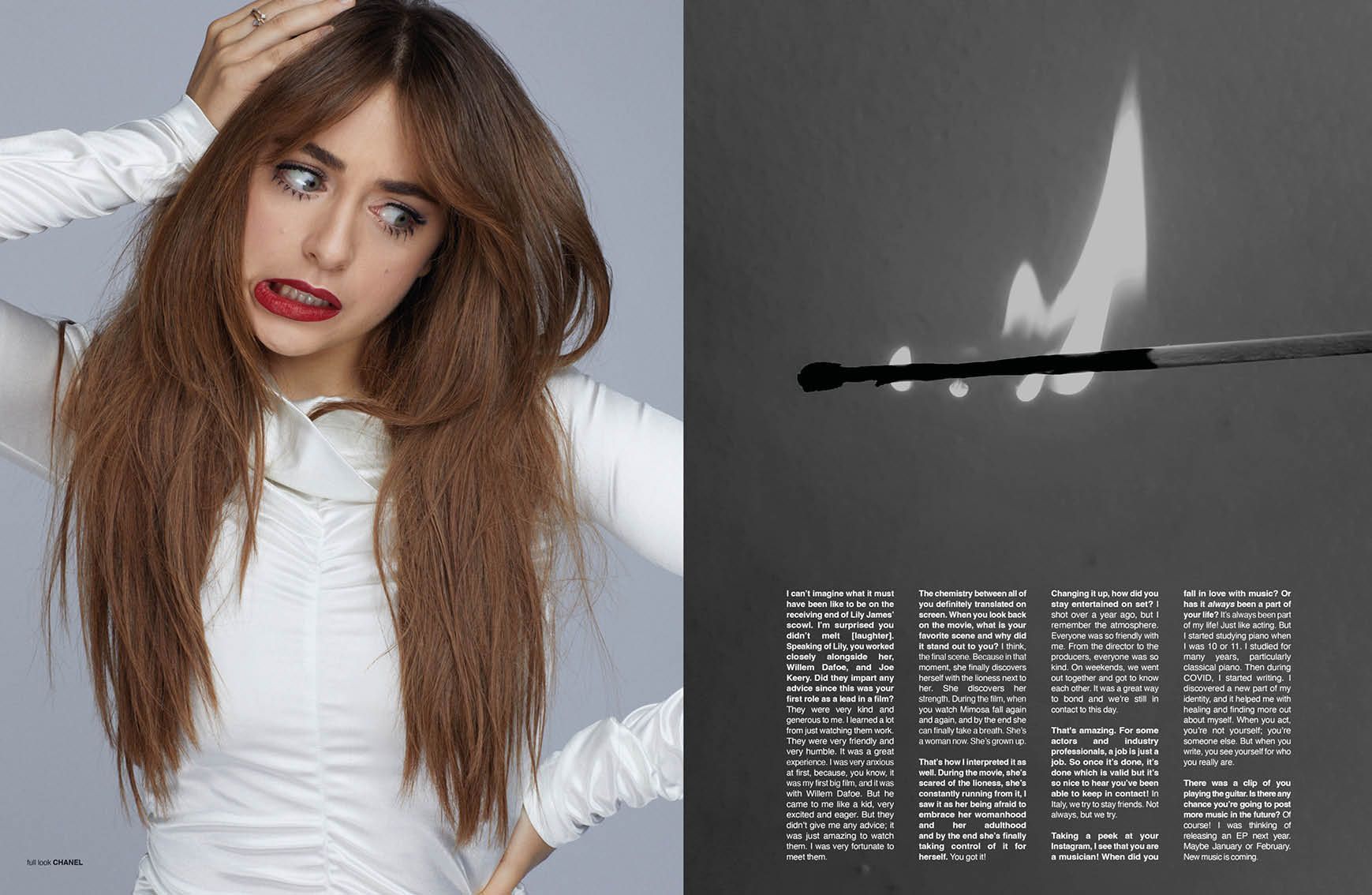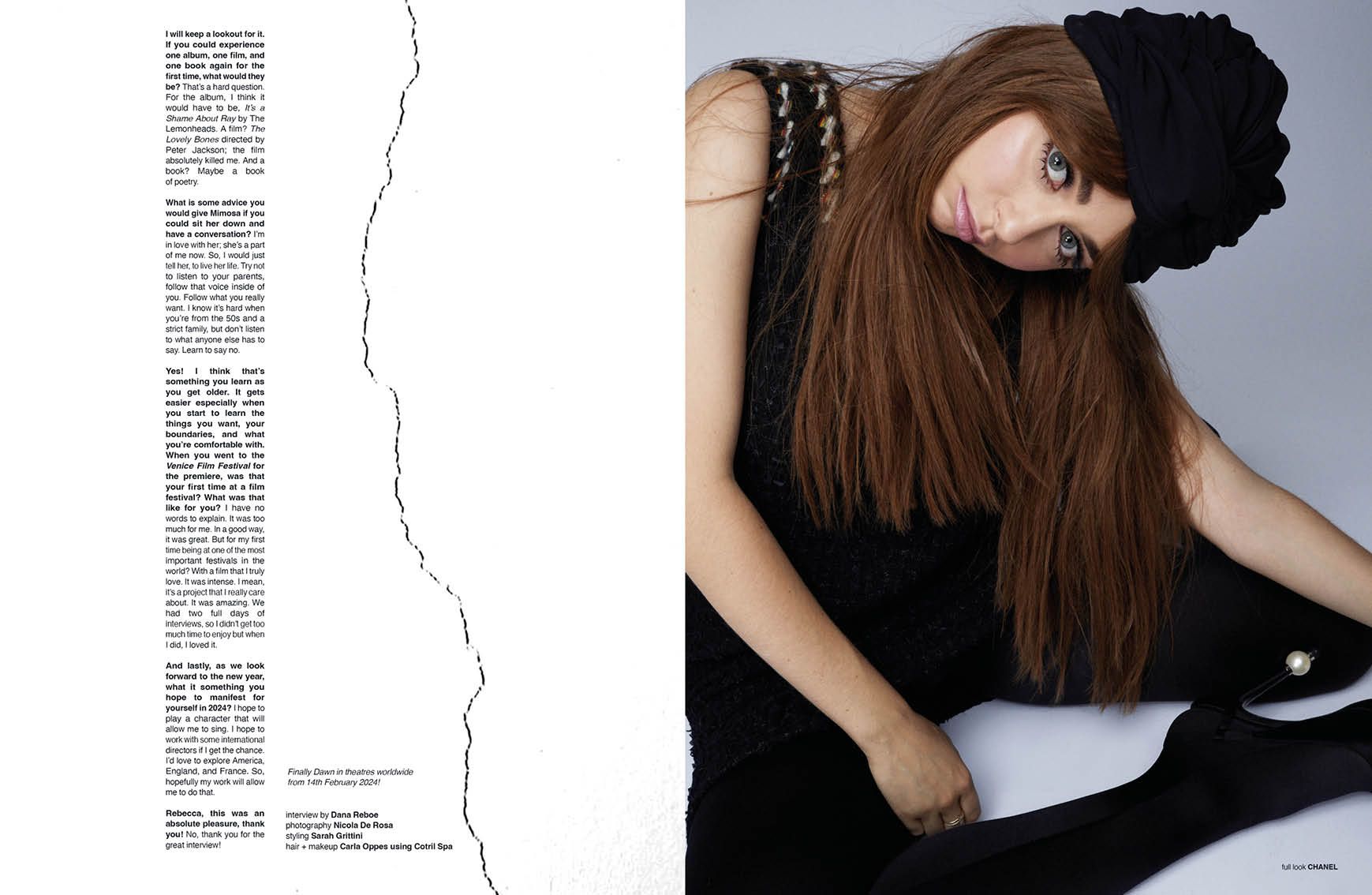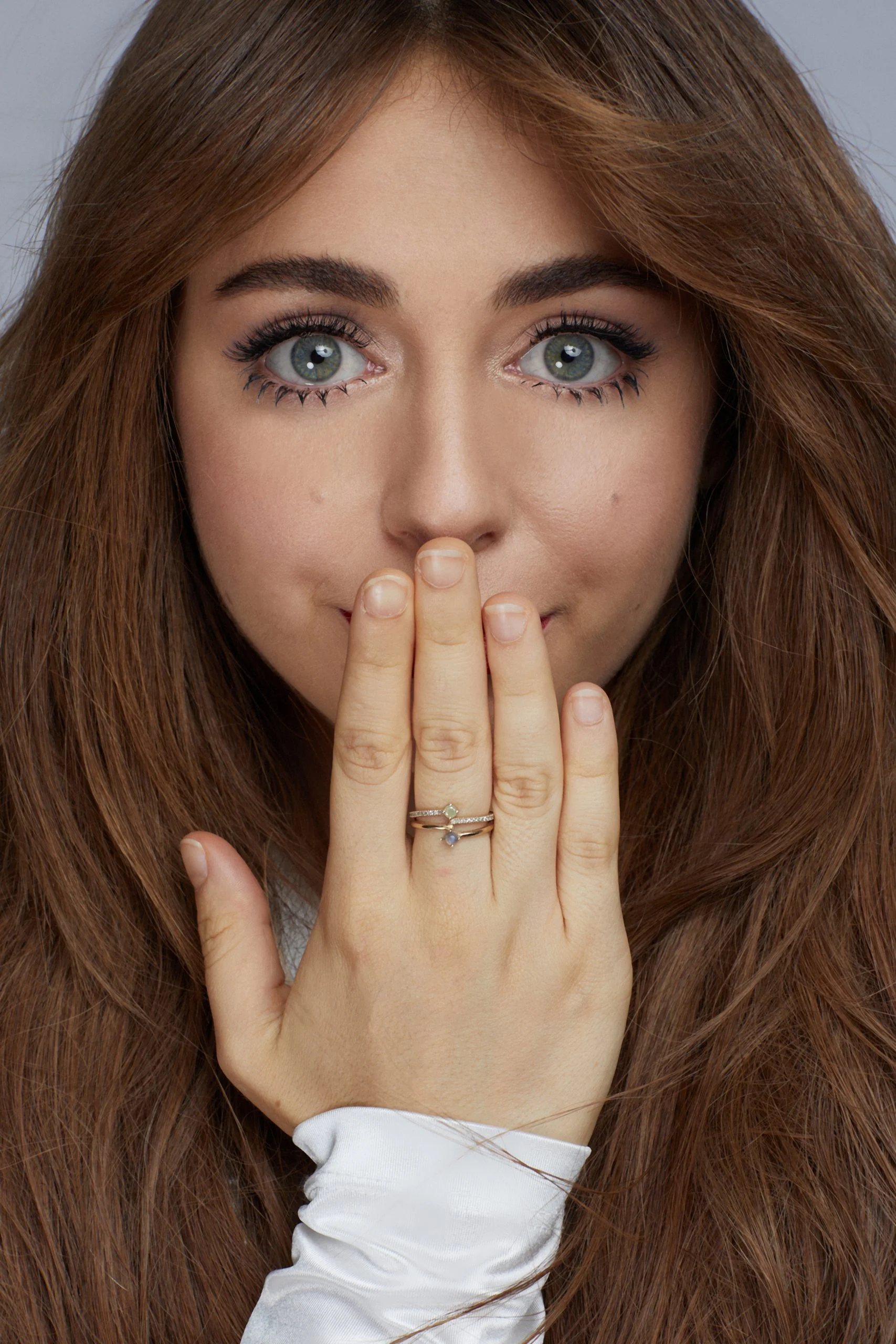
Rebecca Antonaci
In Saverio Costanzo’s Finalmente l’alba, Rebecca Antonaci proves she is leading lady material.
For her first film in a lead role, Rebecca Antonaci holds nothing back. In Saverio Costanzo’s Finalmente l’alba or Finally Dawn, the actress takes us to new depths of vulnerability and fragility as well as to heights of strength and acceptance. On a journey of self-discovery, we follow Mimosa [played by Antonaci] as she maneuvers her way through the night. Akin to the likes of Frederico Fellini films, Costanzo’s heroine is the definition of a fish out of water. Shy, unsure, and ultimately trying to get home, Mimosa’s eyes are opened to the seedy underbelly of old Hollywood, where the heroes she looks up to on-screen are not quite what they seem in real life. With the illusion broken, Mimosa is whisked away by Lily James’ starlet Josephine who sees her as nothing more than the latest plaything. Caught in the whirlwind of glittering parties and shady backdoor deals, this unorthodox coming-of-age story harkens back to the Golden Age of film in the 1950s.
Acting alongside some heavy hitters including Willem Dafoe, Lily James, and Joe Keery, Antonaci shines brightly. While Mimosa may be a composite of Fellini’s wife, Giulietta Masina, Rebecca brings her wide-eyed innocence to the role, capturing the essence of the character to a tee. As the audience, you can’t help but be captivated and caught up as we watch her step into her womanhood and embrace it with open arms. Costanzo and Antonaci put us through our paces; a character study on growing up and stepping into adulthood, Finalmente l’alba is a taste of time long past, told through the lens of a story that remains timeless.
In conversation with 1883 Magazine’s Dana Reboe, Rebecca Antonaci talks about working with Saverio Costanzo, what it was like to be in a lead role for the first time, the premiere at the Venice Film Festival, making music, her love of Mimosa, what advice she’d give to her character, and so much more.
Download Rebecca Antonaci’ full digital cover story.
Rebecca! Thank you so much for taking the time to speak to 1883, we appreciate it! To start us off, when did you discover your love of acting?
I was the first in my family to start this career, and then my brother followed me.
Oh, wow.
[Laughs] Yeah, he’s an actor, too. And this [acting] was something I had in me since I was a child. I started studying at school, and then I discovered an agency and started working in cinema. I mean, my favourite director is Quentin Tarantino who’s inspired me so much. As well as Sofia Coppola and Edgar Wright. Those are my top three, my idols.
Are there any particular films of theirs you find yourself going back to?
Yes! The Virgin Suicides by Sofia Coppola, The Hateful Eight by Tarantino, and the Cornetto Trilogy by Edgar Wright.
Which one is your favourite in the Cornetto Trilogy?
I think it would have to be Shaun of the Dead.

Good choice! So, moving on to Finally Dawn (Finalmente l’alba), you said in an interview with The Hollywood Reporter that playing Mimosa was really easy because everything around you [the setting, the costumes, etc.] was so perfect. How did you go about preparing for the role?
I had a lot of meetings with Saverio [Costanzo], the director, and we prepared for a month. It was very long work, and he explained everything to me. Literally everything. Every thought that she [Mimosa] had during the film, everything around her, so once I was on set it was very natural. I was very well prepared.
The movie takes place in the 1950s, during the golden age of filmmaking. Did you go back and watch any of the epics of the time like Lawrence of Arabia, Ben-Hur, and Cleopatra?
Yes, of course! I watched a lot of [Frederico] Fellini’s films. Especially the ones with Giulietta Masina, Fellini’s wife. And my character is inspired by Giulietta, so she was my main inspiration for Mimosa. I also watched a lot of other movies, including Bellissima by Luchino Visconti to get into the mindset.
You were very young when you started your acting career. What was it like for you to be a kid on set? What were your thoughts and feelings being on productions?
I know it’s strange, but I wasn’t scared at all. I started on a thriller. It was very hard for me because I had four hours of make-up, and my character’s face was burned. I was the victim of a killer so, I found it very hard. I was in an old, scary house, too. But I enjoyed it. I enjoyed the work. I understood the gravity of it.
That’s incredible. Circling back to Finally Dawn, I loved this film. I’ve already watched it twice.
That’s amazing! When did you watch it?

I watched it over the weekend. Once through for enjoyment, and the second time to take notes. I really fell in love with Mimosa. She’s vulnerable, she’s naïve, she’s shy. She’s super innocent and just trying to make her way through the world. What are some qualities you share with her and a few you don’t?
I think I share some of her anxiety. I also don’t wear masks. I try to be my authentic self in front of everyone and that’s what Mimosa does during the film. That’s the thing we have in common. But where we differ is… I can decide things for myself. And she’s following the actors during the movie like she doesn’t know herself. But I know myself. Not completely [laughter], I’m still trying. Also, she’s from the 50s and the time we’re in is very different. Her options are very, very, different.
Mimosa truly is the heartbeat of the film. We, the audience, are caught up in the whirlwind with her. How much free reign did you have with her?
I never improvised. Saverio was very strict; you have to follow him. I tried to put myself into the character, so it was a mix of what Saverio wanted and what I saw in Mimosa.
I love that. One of my favourite scenes is the ‘silent poem’, where Josephine [played by Lily James] tries to humiliate Mimosa. How did you tap into that emotion?
I had a line to follow. First, I had to play it as confused because Mimosa doesn’t understand English. So, she’s like, “Okay, what’s going on? I’m here alone.” But she’s fragile and vulnerable. She couldn’t find it in herself to respond to Josephine. And then, the fear sets in when she starts to cry, then very slowly, the anger. When the audience starts clapping, she goes back to confusion, like, “Seriously, what’s going on?” I enjoyed that a lot. Saverio wanted me to have a blank face. He said to me, “You have to start crying but I don’t want to see anything on your face.” It was a hard thing to do, but I was so into the character. I really had to pull from the audience and watch Lily [James], who was giving me her best glare. She helped me a lot during that scene.
I can’t imagine what it must have been like to be on the receiving end of Lily James’ scowl. I’m surprised you didn’t melt [laughter]. Speaking of Lily, you worked closely alongside her, Willem Dafoe, and Joe Keery. Did they impart any advice since this was your first role as a lead in a film?
They were very kind and generous to me. I learned a lot from just watching them work. They were very friendly and very humble. It was a great experience. I was very anxious at first, because, you know, it was my first big film, and it was with Willem Dafoe. But he came to me like a kid, very excited and eager. But they didn’t give me any advice; it was just amazing to watch them. I was very fortunate to meet them.
The chemistry between all of you definitely translated on screen. When you look back on the movie, what is your favourite scene and why did it stand out to you?
I think the final scene. In that moment, she finally discovers herself with the lioness next to her. She discovers her strength. During the film, you watch Mimosa fall again and again, and by the end she can finally take a breath. She’s a woman now. She’s grown up.
That’s how I interpreted it as well. During the movie, she’s scared of the lioness, she’s constantly running from it, I saw it as her being afraid to embrace her womanhood and her adulthood and by the end she’s finally taking control of it for herself.
You got it!
Changing it up, how did you stay entertained on set?
I shot over a year ago, but I remember the atmosphere. Everyone was so friendly with me. From the director to the producers, everyone was so kind. On weekends, we went out together and got to know each other. It was a great way to bond and we’re still in contact to this day.
That’s amazing. For some actors and industry professionals, a job is just a job. So once it’s done, it’s done which is valid but it’s so nice to hear you’ve been able to keep in contact!
In Italy, we try to stay friends. Not always, but we try.

Taking a peek at your Instagram, I see that you are a musician! When did you fall in love with music? Or has it always been a part of your life?
It’s always been part of my life! Just like acting. But I started studying piano when I was 10 or 11. I studied for many years, particularly classical piano. Then during COVID, I started writing. I discovered a new part of my identity, and it helped me with healing and finding more out about myself. When you act, you’re not yourself; you’re someone else. But when you write, you see yourself for who you really are.
There was a clip of you playing the guitar. Is there any chance you’re going to post more music in the future?
Of course! I was thinking of releasing an EP next year. Maybe January or February. New music is coming.
I will keep a lookout for it. If you could experience one album, one film, and one book again for the first time, what would they be?
That’s a hard question. For the album, I think it would have to be, It’s a Shame About Ray by The Lemonheads. A film? The Lovely Bones directed by Peter Jackson; the film absolutely killed me. And a book? Maybe a book of poetry.
What is some advice you would give Mimosa if you could sit her down and have a conversation?
I’m in love with her; she’s a part of me now. So, I would just tell her, to live her life. Try not to listen to your parents, follow that voice inside of you. Follow what you really want. I know it’s hard when you’re from the 50s and a strict family, but don’t listen to what anyone else has to say. Learn to say no.
Yes! I think that’s something you learn as you get older. It gets easier especially when you start to learn the things you want, your boundaries, and what you’re comfortable with. When you went to the Venice Film Festival for the premiere, was that your first time at a film festival? What was that like for you?
I have no words to explain. It was too much for me. In a good way, it was great. But for my first time being at one of the most important festivals in the world? With a film that I truly love. It was intense. I mean, it’s a project that I really care about. It was amazing. We had two full days of interviews, so I didn’t get too much time to enjoy but when I did, I loved it.
And lastly, as we look forward to the new year, what it something you hope to manifest for yourself in 2024?
I hope to play a character that will allow me to sing. I hope to work with some international directors if I get the chance. I’d love to explore America, England, and France. So, hopefully, my work will allow me to do that.
Rebecca, this was an absolute pleasure, thank you!
No, thank you for the great interview!


All fashion looks are provided by CHANEL.
Finalmente l’alba or Finally Dawn in theatres worldwide from 14th February 2024!
Interview Dana Reboe
Photography Nicola De Rosa
Styling Sarah Grittini
Hair & Make-up Carla Oppes using Cotril Spa




